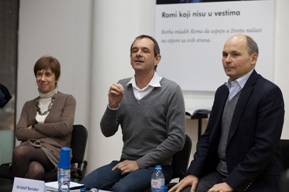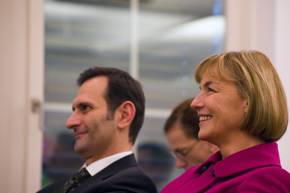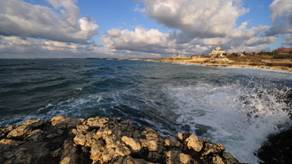Saving visa-free travel - ESI documentaries online - ESI in London, Budapest, and Kyiv
 |
|
|
Winter in Kyiv |
|
The ESI team would like to wish all our readers the very best for 2013
Dear friends of ESI,
2013 will be a big year for those that stand for visa free travel in Europe. Decisions will be made which will affect millions of Europeans directly.
The first of these is between the government of Turkey and the EU, taking place (hopefully) within the next few days: scheduling the official hand-over of a visa liberalisation roadmap by the European Commission to Turkey, along with the signing of an EU - Turkey readmission agreement (see below).
There will be continued debates about visa liberalisation for both Kosovo and the EU's Eastern Partners. While Kosovo's prospects look grim – among senior policy makers in Brussels, ESI does not find anybody who expects any breakthrough soon due to fears of asylum seekers and concern about the situation of Roma in Kosovo – those of Moldova are brighter.
ESI's first report of 2013, published on 1 January this year, addresses "How to save visa liberalisation" in the Balkans (see below). The Economist has featured our report in its current edition. Click here to read it.
The Balkans: Saving visa free travel
2012 has been the year with the highest number of asylum applications by Western Balkan citizens in the EU since the Schengen visa requirement was lifted for their countries. In Germany, Serbian citizens were the largest group of asylum seekers in 2012, before Afghans and Syrians.
Calls to re-impose the visa requirement have become both louder and more frequent. Yet this would be unfair towards hundreds of thousands of Western Balkan citizens who use visa-free travel simply to travel. It would also undermine EU credibility in the Balkans.
In a new ESI report – "Saving visa-free travel. Visa, Asylum and the EU roadmap policy" – which is part of our ongoing work on South Eastern Europe supported by ERSTE Stiftung, we propose an alternative solution. More than 80 percent of all Western Balkan asylum claims are submitted in just four EU member states: Germany, Sweden, Belgium and Luxembourg. Claims were made in these states and not in others because their respective procedures lasted between 3 and 8 months during which asylum seekers are provided with benefits. At the same time, hardly any of these Western Balkan claimants qualify for asylum.
Austria, which has short procedures (1-3 weeks) for Balkan asylum seekers, saw a decrease in numbers of applications since visa liberalization was introduced in 2009. Switzerland recently introduced a 48-hour procedure for asylum seekers from the Western Balkans. It saw a reduction in monthly applications from 780 in August to 95 in November 2012. The reform has streamlined the application process without jeopardizing its ability to identify legitimate asylum seekers.
Instead of going back on visa liberalization, we propose that all EU members have short procedures for dealing with applicants from European countries that meet a series of human rights conditions and are therefore "safe countries of origin". At the same time, the EU should also officially declare them safe countries and stipulate time limits and procedural safeguards for dealing with claims of their citizens.
This would preserve a very successful EU foreign policy tool. It would give reason to Moldova, Kosovo, Turkey, Ukraine and others to carry out further reforms. It would also make explicit the link between future visa-free travel and improving the human rights situation in each of these countries.
Turkey: The Roadmap and beyond
 |
|
|
The dream of easy travel |
|
Serbia was given a visa liberalisation roadmap in May 2008. It received visa-free travel in December 2009. It implemented major reforms during the visa liberalisation process, improving the security of its passports, strengthening border controls and scaling up efforts to fight illegal migration. These reforms continue to contribute to the EU's security.
The question is now: will the same happen in the case of Turkey?
In December, the European Commission showed the final version of the Turkey roadmap to Ankara. The very fact that it is called a "roadmap" is significant – the Western Balkan states all had "roadmaps" and have already received visa-free travel. The same criteria to assess progress should be applied to Turkey, which can expect to see the visa requirement lifted once it meets all the conditions.
The Western Balkan countries needed two to three years. If Turkey implements the required reforms, it need not take longer.
Getting the roadmap will be a real success for Turkish diplomacy. The moment it is officially presented there is no need for any voting in the Council until the European Commission presents a legislative proposal to abolish the visa requirements for Turks. Even then, no single EU member state will have a veto. This proposal will need 229 out of 309 votes in the Council in order to pass.
ESI will continue to follow this process with the support of Stiftung Mercator. For EU-Turkey relations this should become one of the most dynamic areas for real progress in 2013. Last November, we met with Giuliano Amato (the former Italian Prime Minister), Otto Schily (the former German Interior Minister), Anna Maria Cancellieri (the Italian Interior Minister), and former Home Affairs Commissioner Franco Frattini in Rome. We discussed confidence-building steps that both EU member states and Turkey can take to overcome the lack of trust that has built up during a difficult accession process.
ESI Croatia and Moldova documentary films online - watch for free
 |
 |
|
|
Belgrade film screening – Berlin film screening |
||
In the last months of 2012 there have been a lot of screenings of the latest ESI documentary films, part of the award-winning Return to Europe film series supported by ERSTE Stiftung in Vienna: in London, Berlin, Vienna, Belgrade, Istanbul, Graz, and Pristina.
Now you can also watch both films (in German or English) online for free:
Twilight of heroes – Croatia, Europe and the International Tribunal
ESI in January: London – Budapest – Kyiv
 |
 |
|
|
The Future of election monitoring – ESI capacity building for Crimea |
||
In 2012 ESI immersed itself in a lot of work on Azerbaijan. This continues to be covered throughout the international press.
This week ESI will present its new research on Azerbaijan and the Council of Europe in London at Chatham House.
The following week, ESI is organizing a closed policy seminar with the Central European University in Budapest on the future of election monitoring in light of recent difficulties and tensions in countries. More information is available here.
On 24 January ESI analysts are in Kyiv for a capacity building seminar for analysts and think tanks in Ukraine, with the goal of helping to establish a new think tank working on Crimea.

Gerald Knaus
